|
|
|
Sort Order |
|
|
|
Items / Page
|
|
|
|
|
|
|
| Srl | Item |
| 1 |
ID:
151283
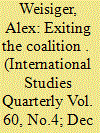

|
|
|
|
|
| Summary/Abstract |
When do countries abandon coalition partners during war? Prominent arguments about alliance dissolution focus on peacetime, yet the ability of alliances to influence international politics ultimately hinges on their cohesion or dissolution during war. In this article, I argue that battlefield circumstances heavily influence the likelihood of defection from coalitions. First, countries fighting independently from their partners make attractive candidates for wedge strategies and hence are more likely to defect. Second, coalitions are more likely to collapse when their members see victory in the overall war as less likely. These predictions contrast with common expectations from theories of the balance of power and of collective action. I test hypotheses about wartime developments statistically using new time-varying data on both front-level troop contributions and battle deaths. Consistent with theoretical predictions, countries are more likely to abandon coalition partners if fighting alone and when the coalition fares worse in recent fighting.
|
|
|
|
|
|
|
|
|
|
|
|
|
|
|
|
| 2 |
ID:
179928
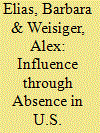

|
|
|
|
|
| Summary/Abstract |
In counterinsurgency, U.S. officials often feel trapped by a localally who appears unable to survive the departure of U.S. forces. Advocates for withdrawal argue that only a deadline to depart will induce local governments to accept greater burdens, while critics of this position argue that plans to withdraw embolden insurgents. We argue instead that American leaders gain leverage from U.S. public opinion favouring withdrawal. Analysis of 200+ U.S. demands of local allied governments in Vietnam and Iraq suggests that public pressure for withdrawal is associated with greater local compliance, but that formal U.S. withdrawal plans does not motivate compliance.
|
|
|
|
|
|
|
|
|
|
|
|
|
|
|
|
| 3 |
ID:
147082
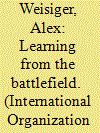

|
|
|
|
|
| Summary/Abstract |
What drives leaders’ decisions about whether to continue or end an ongoing war? The private information explanation for war holds that leaders fight because they believe that doing so will advance national interests, and they settle hostilities when new information reduces their optimism about the possibility of long-term success. Yet significant theoretical disagreement exists about both the extent to which and the manner in which new information, especially battlefield information, promotes settlement. This article unpacks the logic of the informational mechanism, arguing that settlement will be more likely when there has been more extensive fighting and that countries are more likely to make concessions to end wars when battlefield results have deteriorated; short-term spikes in war intensity by contrast do not promote settlement. Moreover, building on work on leadership turnover and settlement, I show that leader replacement is sometimes part of the information-updating process, especially in autocracies: new leaders without political ties to the person in power at the start of the war are more likely both to come to power when war is going poorly and to end wars once in office. Tests of these arguments make use of new participant-level data on the timing of battle deaths for all Correlates of War interstate wars, which allows me to examine the effects of changing battlefield developments across a wide range of cases in a manner that was previously impossible.
|
|
|
|
|
|
|
|
|
|
|
|
|
|
|
|
| 4 |
ID:
119650


|
|
|
|
|
| Publication |
2013.
|
| Summary/Abstract |
Perhaps the simplest explanation for where fault lines lie in a political process involves the presence of an "other." Difference divides and similarity unites. These similarities and differences can in turn orient and propagate conflict. Yet, similarity and difference are also dynamic, evolving in response to changing population characteristics or a new reference point. We offer a simple explanation for interstate conflict in which the salience of similarity or difference varies with the prevalence or capabilities of groups. We apply our argument in the context of the democratic peace. When democracies are scarce or weak, and autocracies plentiful and powerful, democracies face a common threat. As the democratic community strengthens, however, the threat from autocracies declines and differences among democracies appear more salient. Our findings contrast with standard expectations about how democratization shapes world affairs.
|
|
|
|
|
|
|
|
|
|
|
|
|
|
|
|
| 5 |
ID:
139803
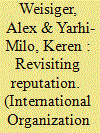

|
|
|
|
|
| Summary/Abstract |
Policy-makers and political scientists have long believed that states must make policy with an eye to maintaining a good reputation, especially a good reputation for resolve. Recent work, however, has argued that reputations for resolve do not form, and hence that past actions do not influence observers' behavior in subsequent interactions. This conclusion is theoretically problematic and unsupported by the evidence offered by reputation critics. In particular, juxtaposing reputation for resolve to power and interests is misleading when past actions influence observers' beliefs about interests, while the common approach of looking at crisis decision making misses the impact of reputation on general deterrence. We thus derive hypotheses about conflict onset from both the arguments of reputation critics and the logic of more standard reputation arguments, which we put to statistical test. We find that past action is closely connected to subsequent dispute initiation and that the effects of reputation generalize beyond the immediate circumstances of the past dispute. Although reputation is not all-important, leaders are well advised to consider the reputational implications of policy decisions in international conflict.
|
|
|
|
|
|
|
|
|
|
|
|
|
|
|
|
| 6 |
ID:
131005
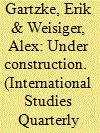

|
|
|
|
|
| Publication |
2014.
|
| Summary/Abstract |
The widely documented dyadic democratic peace observation has led to optimism that the spread of democracy might prove pacifying even outside of democratic dyads. Yet, tensions between the logic of liberal peace in dyads and systems suggest that economic development may be better suited than democracy as a determinant of systemic liberal peace. In particular, regime type heterogeneity (difference) stands to increase conflict at the system level. We argue that there exists a systemic developmental peace, in which increased wealth encourages powerful developed nations to discourage other countries from fighting, even as these same developed states continue to use force in service of their own private objectives. We also separate out the effects of aggregate democracy from regime type difference in our analysis. Systemic and cross-level statistical tests support the following propositions: greater systemic development encourages peace, difference propagates war, and increased systemic democracy has no consistent impact on interstate conflict.
|
|
|
|
|
|
|
|
|
|
|
|
|
|
|
|
|
|
|
|
|